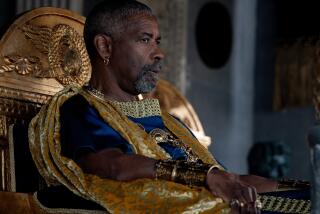MUSIC REVIEWS : A Charming Outing From Ramey, Jones
- Share via
Controlled energy, high polish and effortless teamwork marked the latest Southern California recital by American basso Samuel Ramey, with Warren Jones at the piano, Saturday night.
With Jones playing the entire program from memory--and on a Steinway with its lid fully open--Ramey gave as satisfying a vocal program as one may hear these days. The partners put together a varied agenda, performed it suavely and seemed to charm the large festive audience in Wadsworth Theater in Westwood.
One of the joys of this performance was its consistency: No extended warm-up period or programmatic sagging.
Ramey/Jones brought full artistic attention and complete conviction to every portion, from arias by Handel and Mozart at the beginning; an Early Italian group following, lieder by Schubert and art songs by Barber and Griffes in the middle, or cabaret songs by Gershwin at the conclusion. The internationally noted singer from Kansas and his longtime associate delineated each style separately and performed each item persuasively.
Many joys proved memorable. The textual and musical points--both clearly enunciated--of Mozart’s “Aspri rimorsi atroci,” the urgent yet elegantly understated passion in “Che fiero costume,” the deep contrasts in “Der Tod und das Madchen,” the dramatic subtleties in “Bessie Bobtail” and “Sure on This Shining Night,” and the unforced seductiveness in “Embraceable You.”
In recital, Ramey’s basso seems lyrical and non-operatic, if easily and widely projected; at a young-looking 52, he possesses a voice that was never multicolored in the first place. Yet he uses it with art and technique. Without faking or strain, he ascended to an F above the staff; then, in “Der Tod und das Madchen,” he took the low D confidently.
Jones remains an ideal collaborator: facile, musical, supportive and ever stylish. To the audience, he introduced three Charles Tomlinson Griffes songs helpfully.
The first encore was “Non piu andrai” from “Le Nozze di Figaro,” performed with the same zest, word clarity and pertinence as everything else this evening.
More to Read
The biggest entertainment stories
Get our big stories about Hollywood, film, television, music, arts, culture and more right in your inbox as soon as they publish.
You may occasionally receive promotional content from the Los Angeles Times.










